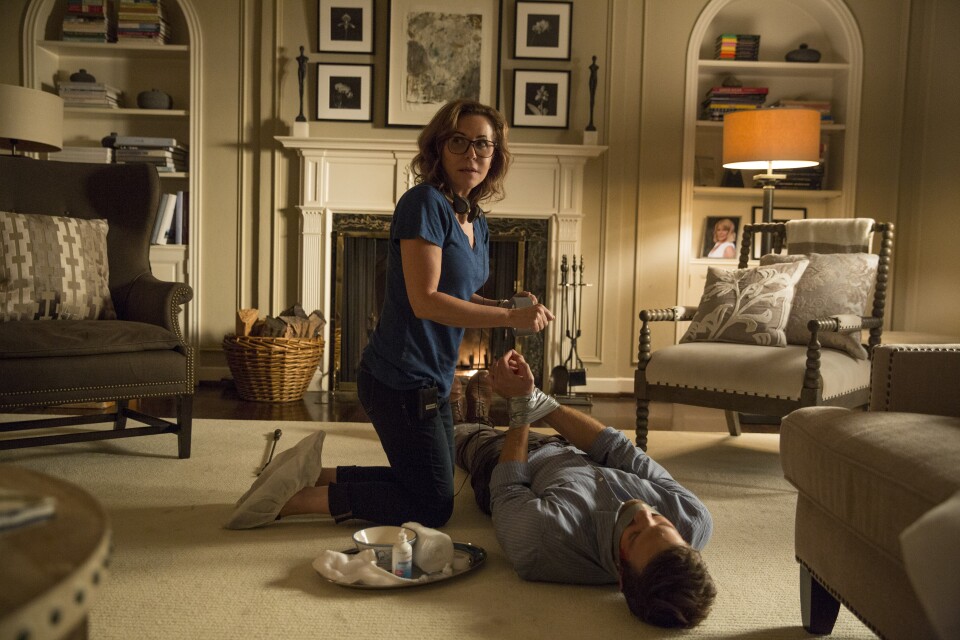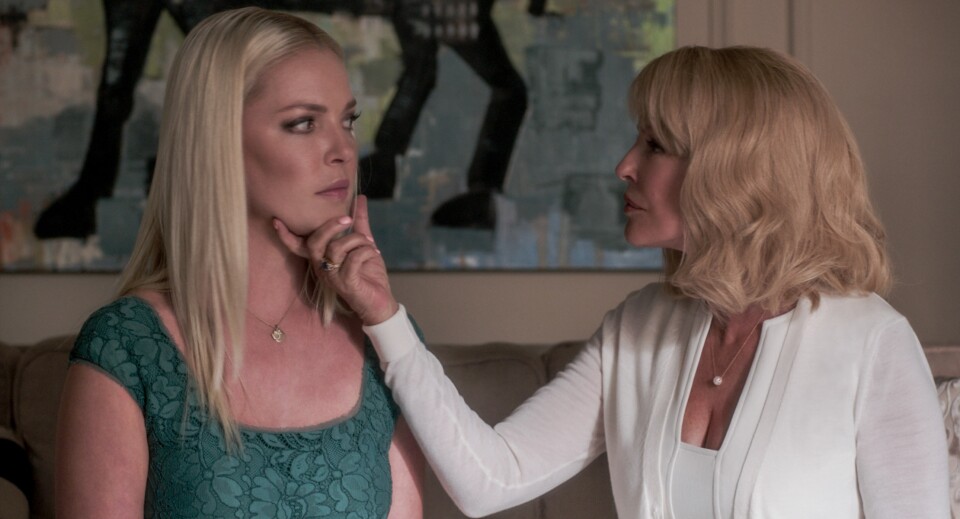When the film's original director dropped out, longtime producer Denise Di Novi decided to take a turn in the director's chair; non-commercial stations that sold some of their broadcast bandwidth are cashing in with tens of millions of dollars.
For 'Unforgettable,' Denise Di Novi switches roles from producer to director
The new film, "Unforgettable," stars Katherine Heigl as a divorced woman whose jealousy takes a turn for the extreme when she starts wreaking psychological revenge against her ex-husband's new fiancee, played by Rosario Dawson.
“Unforgettable” is a first for Di Novi. The long-time producer has made movies since the 1980s, including a few of Tim Burton’s classics, including "Edward Scissorhands" and "The Nightmare Before Christmas."
But now, she’s in the director’s chair. She started out on “Unforgettable” as a producer but when the original director, Amma Asante, fell out, Di Novi took over.
When Di Novi joined us in the studio, we started by talking about those two roles and how she had to adapt to her new gig.
Interview highlights:
On making the transition from producer to director:
As a producer I always tried to be a facilitator for the director. I was a creative, hands-on producer. But you really have to keep the big picture in your head all the time and not focus on too many of the details and the weeds. You'd leave that to the director. But as a director, you have to notice every single little thing and answer every single question and have a very strong point of view and vision of the film. So I really had to, at a certain point when I started shooting, take off my producer hat and let my capable producers Ravi Mehta and Alison Greenspan take that over and get into a zone as a director that was completely creative. My experience as a producer helped me get out of some tough spots and find solutions for things, but it's really more of a creative job.

On how being a producer helped her be a director:
I think I learned more from directors who were not so great and who didn't make great movies than the ones who were great. I think great directors are great in very unique and different ways. Not-so-great directors are very similar. They are usually lazy and don't work that hard and they don't have a really strong, clear point of view that they are relentless in protecting and pushing forward. When I looked back, I thought, I'm not going to be like Tim Burton. I'm not going to be like other directors I've worked with because I am me and I have a very unique point of view that I want to bring to this film. But I don't want to be like those guys that just didn't try that hard and weren't really on top of every little thing. Every detail was important to me. Every question was important to me and I thought, If I've got this shot, I'm going to work as hard as I can and make the best of it.

On how being a woman director contributed to the film:
In this film in particular, it's a story of two women pushed to emotional extremes. I think because I'm a woman director and had two lead female actresses, and we were dealing with a situation that — though they were extreme — we all related to them. We had all lived through things that had some comparison or similarity. So we developed a bond where we were very open, very honest. I think they trusted me. They knew that I was going to protect them or take care of them, even though they were going to these very far reaches of human experience. It was an intimate relationship. If an actor trusts a director, it's in their nature to give 100 percent — to give everything. That's why they do what they do. It's when they don't have that trust where they feel that they're not appreciated or being manipulated. That's what I had observed on the movies I was producing. And I think we felt like, How lucky are we to make this film written by a woman, starring two women, directed by a woman? You know, let's be as authentic and deep as we possibly can.

On the depictions of women she wanted to have and avoid:
I wanted to make a commercial film that was a rollercoaster ride where people jumped out of their seats, yelled at the screen and had fun in all those ways. But it was very important to me to underline and bring to life some really important themes in terms of women's lives and experiences. The first wife goes crazy because she suffers from what I call "the tyranny of perfectionism." She feels like she has to have the perfect life, the perfect body and be the perfect beautiful woman, mother and wife. And of course, nobody can be all that. But our social conditioning is that we should be able to. It's reinforced by Facebook and Pinterest and by Hollywood movies.
So when her life doesn't turn out so perfectly, the resentment and the jealousy, combined with how she was raised and imprinted by her mother — who's played by the amazing Cheryl Ladd, who is also suffering from the tyranny of perfectionism. I wanted to show how women impart this, generation after generation, which Katherine Heigl is imparting on her own daughter that we see in the film, eight-year-old Isabella Rice.
The Rosario Dawson character, Julia, is the victim of domestic violence in her past. She's keeping it a secret because she's ashamed. She feels like she has to be perfect and that she now has the perfect guy and perfect life and she doesn't want to lose it. This vulnerability enables the Katherine Heigl character to drive her crazy. Women, believe it or not, seem to really relate to these situations in the film and feel them very deeply while they're enjoying a scary thriller.
Public TV stations find a quick fix to budget woes
Funding for public television has been under attack in Washington, but a handful of stations are now sorting through stacks of money — tens of millions of dollars, in fact.
Last week, the Federal Communications Commission announced the results of a massive auction. Up for sale were all or part of the broadcast frequencies used by commercial and non-commercial TV stations.
The evolution in digital technology means the stations had more bandwidth than they needed. And phone companies are desperate to buy it up. Many stations around the country — about 175 — have just auctioned some of their surplus bandwidth. L.A. Times reporter
says:
This was meant to raise money for the government. What happens is, the TV stations, which had licenses to use the public airwaves, were able to sell some or part of that frequency that they use back to the government. And the government then sold it to wireless carriers. So about $9 billion was expected to go into the treasury to help reduce the federal deficit.
Non-commercial stations in Southern California benefitted greatly. KCET and KLCS — the latter is owned by the L.A. Unified School District — will each net about $62 million. KVCR — owned by the San Bernardino Community College District — will reportedly net a whopping $157 million.
KOCE (PBS SoCal), which is based in Los Angeles and Orange County, is the only place to find most PBS programming in Southern California. (L.A.-based KCET left PBS back in 2010.)
KOCE made $49 million from the spectrum sale, which is actually less than it was expecting. Still, station president and CEO Andrew Russell has big plans for those funds:
We're going to build out our services. One thing that it's enabled us to do right away is that we launched a new kids channel. We saw the auction coming to a good close and we launched that in January. That's a great example of where we want to go. We'll have strong, over-the-air broadcast channels, but we'll also complement that with digital services and streaming services.
Although the proceeds from the sale give KOCE a big boost, Russell stressed the importance of continuing government aid at a time when Congress is considering to cut off funding for the Corporation for Public Broadcasting:
The percent of our budget [from federal funds] is about 11-to-15 percent. The total amount of funding is anywhere between $2.5 to $3 million a year. It's very important support and it's also very clear that there is no viable substitute for federal funding. It's very important that funding is there and it continues. Public support will be important to making that happen.




